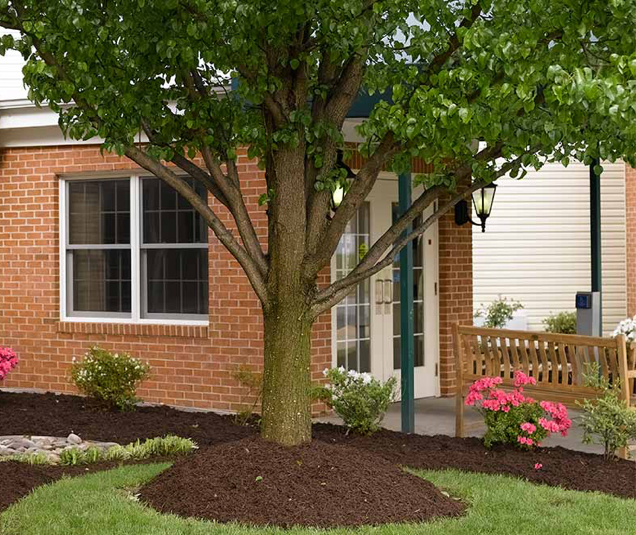As our loved ones age, they may need different kinds of care depending on their situation.
Memory care and assisted living are two distinct forms of long-term care communities tailored for older adults, each addressing specific needs and types of residents. Memory care focuses on individuals living with various kinds of neurodegenerative diseases and other memory specific conditions, while assisted living offers a wider range of basic care.
Both community types emphasize residents’ safety, health, and well-being, providing various levels of care to cater to the diverse requirements of older adults.
An informed decision involves recognizing the differences in focus on care, staff training and expertise, security and safety measures, services, and costs. The best choice depends on individual circumstances—it’s vital to choose a living situation where you or your loved one will feel supported, safe, and content. Peregrine Senior Living is here to assist you in determining which option might be the most suitable for you or your loved ones.
Exploring Assisted Living & Memory Care
Assisted living communities strive to find a harmonious balance between delivering essential support and empowering residents to maintain as much independence as possible. By implementing a structured yet adaptable care framework, these communities foster the well-being and autonomy of older adults, ensuring a safe environment through professional assistance.
Conversely, memory care environments are meticulously designed to enhance clarity and ensure residents’ safety, making them ideal for individuals in need of specialized care. By incorporating tailored programs, cognitive therapies, and interactive activities, the goal is to stimulate memory and cognitive functions, enhancing mental acuity and slowing the progression of memory decline.
Assisted Living Vs. Memory Care
Delving into the disparities between assisted living and memory care illuminates significant differences in services, despite both aiming to create supportive residential settings. Here’s a detailed examination:
Both settings offer residents lodging, meals, and aid with daily tasks, yet the types and depth of services vary considerably.
Staff Training: Memory care communities employ staff with specialized training tailored to address the unique challenges confronted by individuals with Alzheimer’s and other forms of dementia. This specialized training equips them to deliver the nuanced care necessary for these residents. While assisted living staff members are also proficient, the level of specialized training in memory care stands out significantly.
Security Measures: Memory care environments prioritize resident safety through enhanced security features like secured exits and monitored outdoor areas to prevent wandering. In contrast, assisted living fosters a more open atmosphere that promotes greater independence among residents.
Activities and Programs: Memory care programs are customized to enhance cognitive abilities and provide support for those experiencing memory loss, fostering a nurturing environment that meets their specific requirements. Assisted living offers a wide array of activities geared towards general enjoyment and social interaction, lacking the specific focus on cognitive stimulation seen in memory care.
Supervision Levels: Residents in assisted living communities benefit from increased independence, managing their finances and making personal choices with less oversight. Conversely, memory care delivers a structured setting with heightened supervision to ensure the safety and well-being of residents dealing with memory impairments.
Cost Considerations: Due to the specialized care, advanced security measures, and tailored programming, memory care typically carries a higher financial burden compared to assisted living. These additional costs reflect the elevated level of support provided to residents with memory-related conditions.
When determining the best fit between assisted living and memory care for your mother, it’s crucial to assess her specific needs. Assisted living may suit individuals requiring minimal assistance, while memory care is designed to offer specialized support for those dealing with memory-related conditions. The ultimate decision hinges on selecting the most fitting level of care to enhance her overall quality of life.

Navigating the Decision-Making Process
When contemplating assisted living or memory care options for your loved one, it’s crucial to evaluate their existing needs, preferences, and safety considerations.
Engage in dialogue with their healthcare provider to delve into medical status and the level of care that is required. Furthermore, explore various communities through tours, inquiries, and assessments of factors like proximity, facilities, staff availability, and financial implications.
Involve your loved one actively in the decision-making process regarding their future residence.
Optimizing Your Decision-Making Process
The choice between assisted living and memory care is typically influenced by medical guidance or when there’s a clear indication that a more concentrated and specialized level of care is essential to effectively address an individual’s requirements.
Assisted living suits individuals needing minimal assistance with daily tasks, whereas memory care caters to those necessitating comprehensive support due to cognitive conditions.
At Peregrine Senior Living, we recognize the challenges involved in making this decision. We encourage prospective residents and their families to explore our community and understand how we can deliver personalized care and assistance aligned with your loved one’s needs.
Whether opting for assisted living or benefiting from our dedicated memory care services, we aim to facilitate a seamless transition into a comforting and supportive environment. Reach out to us today to uncover how we can support you in selecting the optimal care path for your loved one’s well-being and comfort.













No more posts